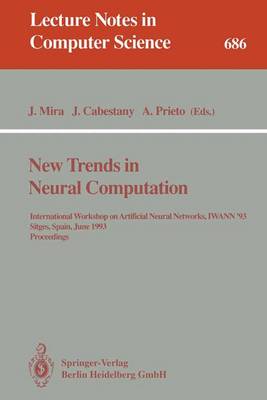Lecture Notes in Computer Science
1 primary work
Book 686
New Trends in Neural Computation
Published 27 May 1993
Neural computation arises from the capacity of nervous
tissue to process information and accumulate knowledge in an
intelligent manner. Conventional computational machines have
encountered enormous difficulties in duplicatingsuch
functionalities. This has given rise to the development of
Artificial Neural Networks where computation is distributed
over a great number of local processing elements with a high
degree of connectivityand in which external programming is
replaced with supervised and unsupervised learning.
The papers presented in this volume are carefully reviewed
versions of the talks delivered at the International
Workshop on Artificial Neural Networks (IWANN '93) organized
by the Universities of Catalonia and the Spanish Open
University at Madrid and held at Barcelona, Spain, in June
1993. The 111 papers are organized in seven sections:
biological perspectives, mathematical models, learning,
self-organizing networks, neural software, hardware
implementation, and applications (in five subsections:
signal processing and pattern recognition, communications,
artificial vision, control and robotics, and other
applications).
tissue to process information and accumulate knowledge in an
intelligent manner. Conventional computational machines have
encountered enormous difficulties in duplicatingsuch
functionalities. This has given rise to the development of
Artificial Neural Networks where computation is distributed
over a great number of local processing elements with a high
degree of connectivityand in which external programming is
replaced with supervised and unsupervised learning.
The papers presented in this volume are carefully reviewed
versions of the talks delivered at the International
Workshop on Artificial Neural Networks (IWANN '93) organized
by the Universities of Catalonia and the Spanish Open
University at Madrid and held at Barcelona, Spain, in June
1993. The 111 papers are organized in seven sections:
biological perspectives, mathematical models, learning,
self-organizing networks, neural software, hardware
implementation, and applications (in five subsections:
signal processing and pattern recognition, communications,
artificial vision, control and robotics, and other
applications).
